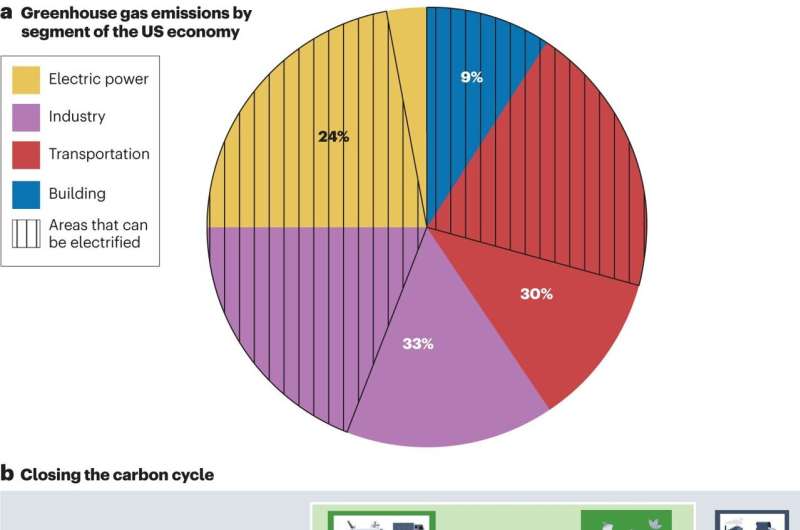This article has been reviewed according to Science X's editorial process and policies. Editors have highlighted the following attributes while ensuring the content's credibility:
fact-checked
trusted source
proofread
Q&A: Plastic waste is a global problem, but carbon recycling can help

Heavy industries such as aviation and chemical manufacturing contribute to about 20% of overall U.S. greenhouse gas emissions and will continue to depend on fossil fuels.
While scientists are continuously exploring ways to reduce fossil fuel use in these sectors, Oana Luca, assistant professor in the Department of Chemistry at the University of Colorado Boulder, explores technologies like recycling and carbon capture to prevent carbon from ending up in the environment.
Luca and her collaborators recently published a report on reducing carbon emissions through carbon recycling in these hard-to-electrify industries. The roadmap appeared on May 1 in the journal Nature Reviews Chemistry.
"We produce a lot of new materials to support our modern life, but most of them just end up in landfills. We need to reinvent ways we recover and reuse these materials so each carbon atom could be used multiple times," Luca said.
Luca, who is also a fellow of the Renewable & Sustainable Energy Institute, gives her take on decarbonization, her research in plastic recycling and the importance of closing the carbon cycle.
Why are some of these sectors difficult to decarbonize?
Switching from fossil fuels is difficult in general because of ingrained practices. It takes a lot of time and effort to develop technologies that can utilize alternative fuels, like solar or wind, as efficiently as the current methods. For example, electric vehicles use an electric motor instead of the conventional engine in gas vehicles. So the barrier to adoption is pretty high.
How is recycling related to electrification?
In general, electrification is the process of switching from fossil fuels to alternative energy sources. Recycling can convert plastic waste to fuels, which can be used to power other things and prevent carbon from getting into the atmosphere.
Despite widespread plastic recycling schemes being implemented across the country, quite a lot of the plastic waste will still end up in landfills. This is largely because we don't have the technology in place to recycle plastics efficiently. We produce these materials, which have great properties, on scale, but the pace of recycling isn't keeping up.
The report serves as a road map to 'close the carbon cycle.' What does a carbon cycle look like?
Imagine a typical T-shirt, like one you, I and most people probably own. It's likely made of nylon, which is a type of polymer. The shirt has undergone a long production process where small molecular chemicals are combined to form larger ones, which are then assembled into fibers. The fibers are woven into fabrics and eventually turned into a T-shirt.
When we get tired of the shirt, or it's worn out, we either throw it into the trash or donate it. But at the end of the day, the shirt will end up in a landfill.
What if there's an option to take the shirt to a facility to recover the carbon-based materials it is made of and use them to make a new shirt? This is what a circular model looks like. In this model, the carbon in the shirt doesn't just end up in the environment but instead gets recycled.
How do we currently recycle?
The most common method for recycling organic materials, including plastics, is called mechanical recycling. To recycle a plastic water bottle, the bottle is heated up, melted down and then pushed through molds to make pipes or sheets. These products are lower in quality and no longer recyclable. So, even in the best-case scenario when your bottle actually gets recycled, the plastic can only be reused once. It's more like downcycling than recycling.
Another method of recycling is to burn the plastics and use the energy from combustion as power. But during that process, you are producing large amounts of carbon dioxide and other greenhouse gases.
How can we innovate the process?
Here in my lab, we use electricity to break apart the plastics into their molecular building blocks without changing their properties or releasing carbon dioxide. This allows us to start thinking about how to reconstruct the water bottles or T-shirts with these molecular raw materials.
What do you hope to achieve through this report?
We need to reinvent the way we consume, conserve and reuse the materials around us. We need to be responsible for where the materials end up.
We also hope to encourage scientists, engineers, economists and social scientists to work together, and find new ideas for closing the carbon cycle. It will take a village to allow some of these technologies we talked about to develop and become integrated into a circular economy.
I'm really excited to share that we just received a grant from CU to work on a project called Polymers for a Sustainable Earth (POSE). Led by Wei Zhang, chair of the Department of Chemistry at CU Boulder, I am hoping to tackle the plastic problem together with faculty from six CU Boulder departments and the National Renewable Energy Laboratory
My group will focus on making recycling more efficient, while other groups will work on redesigning plastics with recycling and reuse in mind.
More information: Wendy J. Shaw et al, A US perspective on closing the carbon cycle to defossilize difficult-to-electrify segments of our economy, Nature Reviews Chemistry (2024). DOI: 10.1038/s41570-024-00587-1
Provided by University of Colorado at Boulder




















